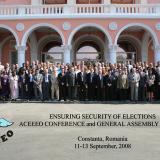To read the full text of the concept paper and the conclusons, please click
here.The Association of European Election Officials (ACEEEO), considering that an election is strongly affected by the integration of effective security policies and practices into the electoral process, calls its Members to take into account the basic considerations as follows while planning and performing their activities.
Basic considerations regarding the role of the law enforcement bodies (police) in the security of the elections:
• The Electoral Management Bodies (EMB) should keep a link to the law enforcement forces continuously.
• In the democratic countries, the police forces are under a civil control, which is in contradiction with any military supervision.
• The police forces are providing services for the state and the citizens and not performing the oppressive function.
• The police forces shall have a persistent relationship with the EMB and should take actions after common decisions.
• During fair elections the police have to ensure the public order.
• The individual human rights must be guaranteed during the whole election process.
• The police forces are impartial (independent from the political parties). The government is responsible for ensuring this impartiality.
• It is important to set up a consultation forum between the police forces and the EMB (methods, publications).
• Training of the policemen should be organised on election processes.
• Political parties should be informed about the activities of the police forces.
• The police forces should be able to solve the problems in a pro-active way, instead of using any force.
• Supporting the right for demonstrations is sometimes difficult, but forces could be used in order to keep the public order.
• Criminals should not take part in the election process (pro-active actions).
• The usage of the criminal’s economic power during the electoral process should be avoided (pro-active actions).
• In order to avoid election fraud, pro-active actions should be taken.
• As to financing, usually there is no extra budget for the election-related tasks, so the cost of the police actions should be covered by the annual budget of the police.
• As for election campaign, great efforts should be made by the police to maintain the public order during the demonstrations.
• There is no need for the introduction of special actions during the election process, the police forces should use from the range of actions and measures normally available for them.
• The police should inform the media about the activity of the police during the electoral process.
Basic considerations regarding secure application of IT and security of election documents:
• Council of Europe E recommendations (No 11, 2004) should be followed
• It is necessary to meet data safeguarding requirements.
• A secured network ( i.e. for data transmission) must be available.
• Independent systems (from other applications) need to be built.
• E-voting systems give less possibility for human interventions (human error).
• Pre-tests, before the election process compliance tests, and after the election the “lessons-learned” process must be implemented.
• It is important to have a verified counting process without the possibility of any interference.
• EMB has to define their own rules (by authorisation, or after own decision).
• Training for the actors of elections at every level (electoral staff, commission members, media staff) must be provided.
• Voter registry can be based on the central population registry (vote card, passport).
• For quality control purposes, it is recommended to use one secured printing house for all the ballot papers.
• It is necessary to use the security elements on the ballot papers.
• A centralized logistics plan is to be elaborated.
 Our Association brings together on an annual basis experts and heads of the election management bodies from all over Europe to discuss how to strengthen good governance through the conduct of democratic elections. In 2008, leading democracy and election experts from all over the world, including old EU members and from newly joined EU countries exchanged experience, lessons learned and shared ideas on electoral democracy. Hosting the international conference in Constanza, our Romanian colleagues had an excellent opportunity not only to provide background for holding professional discussions but also to demonstrate the cultural, socio-economical and political context of their activities.
Our Association brings together on an annual basis experts and heads of the election management bodies from all over Europe to discuss how to strengthen good governance through the conduct of democratic elections. In 2008, leading democracy and election experts from all over the world, including old EU members and from newly joined EU countries exchanged experience, lessons learned and shared ideas on electoral democracy. Hosting the international conference in Constanza, our Romanian colleagues had an excellent opportunity not only to provide background for holding professional discussions but also to demonstrate the cultural, socio-economical and political context of their activities.  The conference was supported by the Education, Audiovisual and Culture Executive Agency of the European Commission.
The conference was supported by the Education, Audiovisual and Culture Executive Agency of the European Commission.

